One Year After Wildfires Decimated California Rancher's Herd and Legacy, Devastation Fuels Change
U.S. Farm Report 08/14/21 -Grit with Grace California Fire
Surrounded by cattle and silence, Dave Daley’s serene California setting is scattered with scars.
“It's really hard for me to go back and see it, because there's so much history,” says Daley.
As the California cattle rancher strolls this land in the Golden State, some of it has been ranched by his family for six generations. The land is his most precious resource, as in the summer, his cattle graze the area mountain range, living off the wild vegetation.
“I consider myself an environmentalist,” he says. “It doesn't have to be an either or. I love the wild. I miss it. I go up there and it's devastating.”
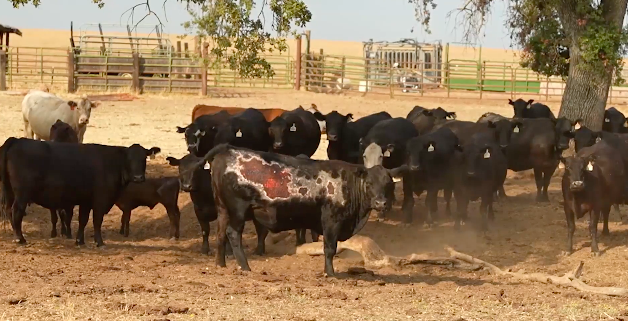
The devastation of which he’s reminded daily with barren land, charred trees and even surviving cattle bearing scars – devastation painted for miles in Butte County, California. What started as a small fire on August 17, 2020, reached the Plumas National Forest, where Daley’s 400 head of cattle were grazing, on September 8th. And the majority of those cattle never made it out.
“The scope of the August Complex in the Bear Fire as it began to explode, it destroyed our cow herd,” he says. “They died tragic deaths. Some on fire, running away, and dying, collapsing wherever. And they were usually around water.”
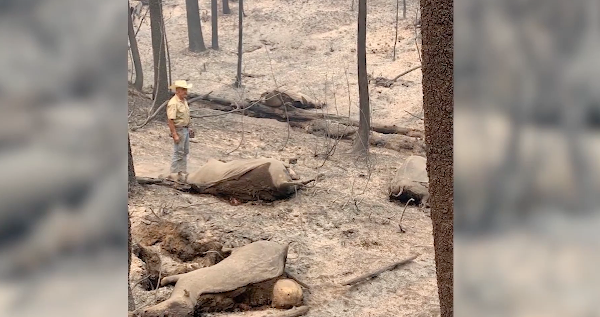
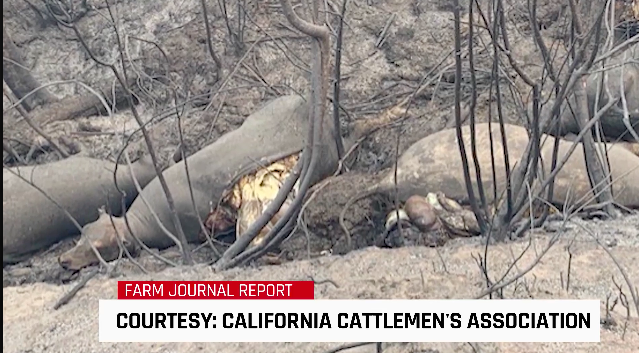
18 to 20 hours a day, Daley and others tried to navigate the rugged terrain to find any survivors they could, much of the landscape unrecognizable, relying on a deep knowledge of the mountains to search.
“It also destroyed our legacy,” he says. “We've been taking cattle to the mountains of the Sierra Nevada since the 1880s, before there was even a National Forest Service. So, it's both public and private land belongs to the forest service, half of it the other half to see our pacific. And it was big timber, a beautiful ecosystem and it's gone.”
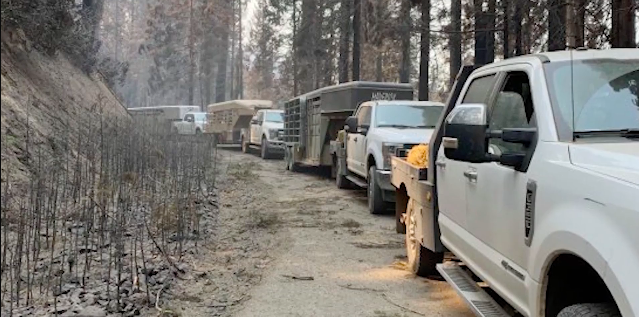
Nearly a year later, the Dixie Fire currently burning in California forced evacuations in Daley’s home county just this week. Too close to home for a rancher who is still dealing with the aftermath of tragedy last year.
Daley still can’t hide his emotions, as he says the days the fire raced across nearby forests were bottled up in sadness, grief and then anger.
“There are times I feel worse for the cattle that we lost. And clearly, it's a huge economic impact, right, that's devastating,” says Daley.
Yet other times, it’s thinking about the future that ignites frustration and grief.
“My granddaughter will never see that forest again the way it was. Neither will anyone else, at least not in my lifetime. I've talked with people all over the country, they’ve said, ‘well, it will look good the next year, the grasses come back.’ Until, you’ve seen it, they don't get the scope. They don't get the disaster that occurred and how massive it is. And when you kill 150 year old trees, we aren't going to see it ever again.”
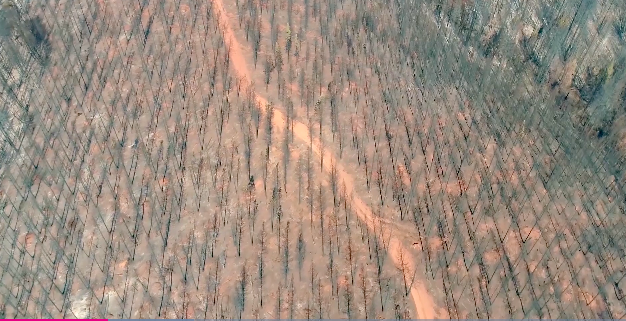
The fire didn’t just torch daily’s livelihood. As Daley will tell you, his family has ranched this area since the 1800s, and out of all the families who ranched this land then, the Daleys are the only ones left.
“There were about 50 ranchers, and we're the last of those 50 ranchers," he says. “I know all their names, all their history, they've all disappeared. Due to regulation, economy, politics, none of them are in business up here anymore. We've survived that long.”
Survival is something it seems is engrained in Daley, even as he battled the sorrow of losing his herd and decades of work.
“But part of the challenge is the cattle have to be adapted to the mountain range to the climate,” he explains. “Its not like we can go buy 400 cows, which is essentially what we lost, and take them up there and turn them loose. They wouldn't do well. They wouldn't know where to go."
Immediately, Daley searched for changes to raising cattle in this area, all of which came at a cost.
“We're going to deal with it,’ says Daley. “But we've had to make some really dramatic adjustments not having a place to take those cows this summer. We've made changes. We're adapting, we're actually feeding some cows in the summer, which I’ve never done in my 63 years of existence. So, that's expensive. But you don't want to lose your genetic base. You just kind of keep going.”
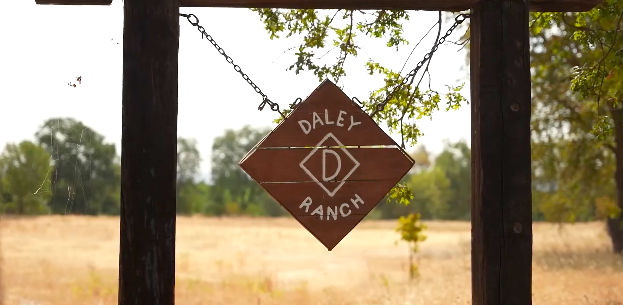
Some changes Daley made, like sourcing feed this summer, were temporary, whereas others may be permanent. Grazing 400 cows on what was once luscious land is something Daley doesn’t know if they’ll ever be able to do again. And the scars of this one fire Daley fears will last for generations.
“I don't think people recognize the intensity of the fire. I've been up there. And it's, it's not there,” he says. “It's a different ecosystem. It's big conifers, fur and pine and big, big trees. It’s not like I’m waiting for grass to grow, there was never that much grass to start with.”
He says the United States Forest Service told him he could take cattle up to the mountains to graze this year if they chose to do so.
“And we wanted to,” he says. “My mom's 90, I wanted to take cows up for her. There was nothing to go to.”
With fewer cows to feed, his sorrow turned into a passion.
“I've made a commitment that it's what iI need to do. And frankly, I don't have as many cows take care of right now. So, I'm doing it. I'm putting everything I can into it,” says Daley.
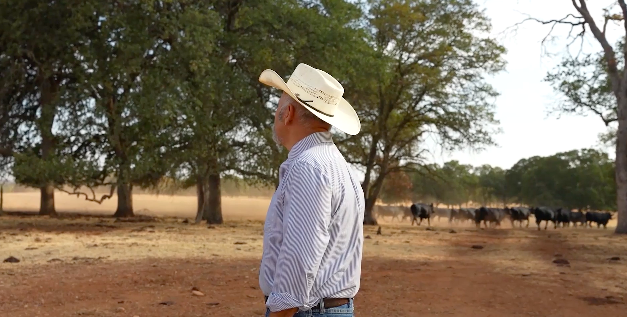
That passion is now Daley’s fight to save what’s left, and using his voice to create change.
“I've basically made a commitment that this is really important to me right now. So, I'm working on it at every level I can, through Cal Fire, with Governor Newsom, his staff came to visit the ranch and look at the fire. I’m working with our California Cattle Council, with California Cattlemen’s Association.”
From various leadership roles, to testifying on Capitol Hill, Daily is making known the impact of the North Complex West Zone fire that ravaged millions of acres.
“I'm hopeful that people are starting to pay attention. Unfortunately, it takes tragedy for people pay attention,” says Daley. “I don't think this is about my cows being killed. Although some people are sympathetic, but when starting to destroy their homes, and they can't get insurance, and it's starting to burn towns like Paradise and the Camp fire or Berry Creek in this fire, then they start paying attention."
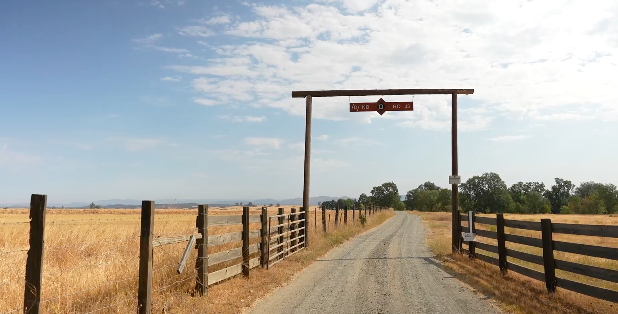
Daily wants that attention to turn to a solution, as pinpointing the cause creates a bigger divide. The extreme politics – on both sides- are what he says are the problem, not the solution.
“One of my frustrations is people who want to spend time arguing about what caused it,” he says. They’ll say it's climate change. Let's fix it. We didn't rake the floor enough. Let's fix it. I'm really tired of people who really aren't close enough to understand what truly happens. The fires destroyed millions of acres, and you argue about whether it's climate change or not. Again, it's one of those moot points since it's happening. But if you don't think burning 4 million and acres in California last year is going to impact the climate, you aren't paying attention.”
With three kids involved in the ranch in various ways today, Daley’s fight for change is selfless.
“Everybody thinks about the glamour piece, that I'm on horseback gathering cows,” he says. “They forget fixing fence, hauling hay, or whatever it happens to be. And so you have to really be born into it and care for it. I know all three of my kids do. They're there. They’ve got it. It's deep in their soul. You can feel it when you talk to them.”
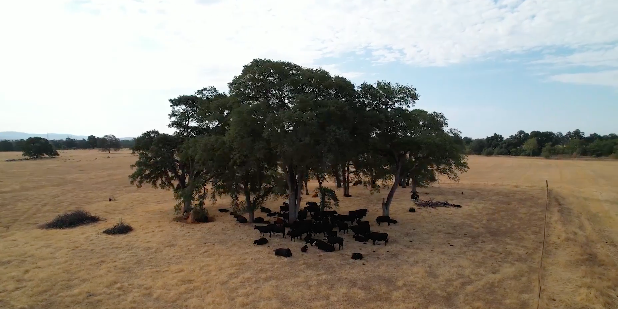
Adaptable and resilient. Those are traits needed, and traits that allow area ranchers like Daley to survive in the area, even as he searches for the path to rebuild and keep the Daley family ranching legacy intact.
“I don't know exactly what that path will be, but I’m not quitting. Neither are my kids. We're just going to keep going.







